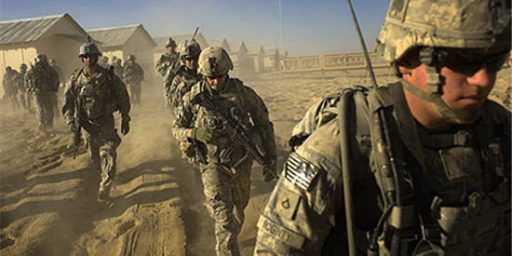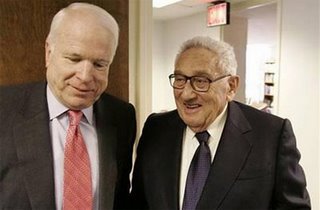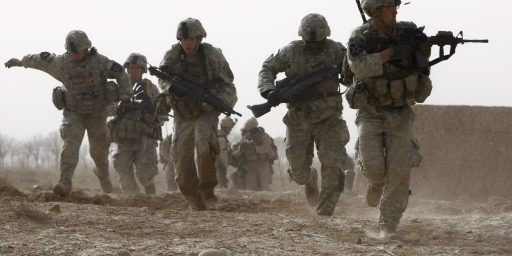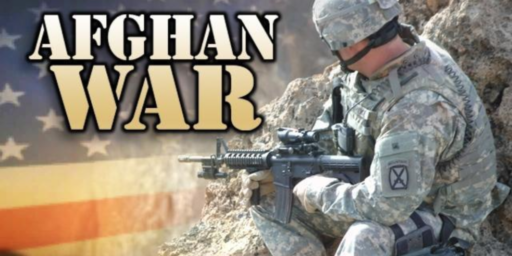Going Wobbly on Afghanistan
Following George Will’s vote of “no support” last week for Afghanistan, Sunday’s newspaper opinion pages are chock-full of doubts about our conduct of the war there. Tom Friedman wonders whether the Karzai government in Kabul can ever be a functioning ally:
As the military expert Anthony Cordesman, who has advised the U.S. Army in Afghanistan, explained in The Washington Post recently, it requires “a significant number” of U.S. reinforcements and time to do what the Kabul government has failed to do, because it remains “a grossly overcentralized government that is corrupt, is often a tool of power brokers and narco-traffickers, and lacks basic capacity in virtually every ministry.”
To put it another way, we are not just adding more troops in Afghanistan. We are transforming our mission — from baby-sitting to adoption. We are going from a limited mission focused on baby-sitting Afghanistan — no matter how awful its government — in order to prevent an Al Qaeda return to adopting Afghanistan as our state-building project.
Nicholas Kristof worries that our tactics there are self-defeating:
President Obama has already dispatched an additional 21,000 American troops to Afghanistan and soon will decide whether to send thousands more. That would be a fateful decision for his presidency, and a group of former intelligence officials and other experts is now reluctantly going public to warn that more troops would be a historic mistake.
The group’s concern — dead right, in my view — is that sending more American troops into ethnic Pashtun areas in the Afghan south may only galvanize local people to back the Taliban in repelling the infidels.
“Our policy makers do not understand that the very presence of our forces in the Pashtun areas is the problem,” the group said in a statement to me. “The more troops we put in, the greater the opposition. We do not mitigate the opposition by increasing troop levels, but rather we increase the opposition and prove to the Pashtuns that the Taliban are correct.
Ahmed Rashid, a long time observer of Afghanistan, writing in the Washington Post urges a more minimalist commitment and hopes for what may be the impossible:
To emerge from this mess with even moderately credible Afghan partners will be difficult, but it has to be done. (The Americans could start by forcing Karzai to create a government that includes all leading opposition figures.) Without a partner, the United States becomes nothing but an occupying force that Afghans will resist and NATO will not want to support. Holbrooke’s skills as a power broker will be sorely tested, with his past successes in the Balkans a cakewalk compared with this perilous path.
The Obama administration can come out of this quagmire if it aims low, targets the bad guys, builds a regional consensus, keeps the American public on its side and gives the Afghans what they really want — just the chance to have a better life.
Doyle McManus, in the LA Times, urges President Obama to show leadership on Afghanistan:
To learn whether the war is even winnable, and to avoid seeing it turn into another Vietnam, Obama needs to do two things. He needs to rally public and congressional support behind another troop increase; that, oddly enough, will be the easy part. And he needs to find ways to make Afghanistan’s government work, by ramping up the civilian surge and getting aid directly to local leaders who deliver services to their constituents — even if, in some cases, they aren’t as clean as we’d like. That will be the hard part.
As I have said before my view on Afghanistan is roughly Rory Stewart’s, who probably knows as much about Afghanistan as any Westerner does. Basically, we need to lower our expectations of what might constitute victory in Afghanistan and along with them our forces to a level that won’t be interpreted as occupation by the Afghans. The mission would be a combination of counter-terrorism, development, and force protection.
After eight years that will be a terribly hard sell but not, I think, as difficult as the alternatives.
Critics are right: we’ve already tried the “off-shore” alternative and it failed. However, I have yet to see clear signs that counter-insurgency could be an effective approach in Afghanistan, large, poor, without resources, and without much support for a strong central government—a prerequisite for COIN. There’s another problem with COIN that I haven’t seen commented on: to implement the approach we’re urging a military on Afghanistan the size of the United Kingdom’s. Is there any way that a military of that size, funded by the resources of the United States, would be seen as anything but a threat by its neighbors?
That leaves an ongoing commitment to counter-terrorism in Afghanistan. That sort of commitment is deeply unpalatable to Americans but, as I’ve said, it beats the alternatives.






Dave:
I don’t know that a purely defensive posture is sustainable. You can’t just hunker inside a perimeter and take mortar fire all day long.
Unfortunately so long as the Taliban has safe haven in Pakistan that’s what we’re doing anyway: waiting for the enemy to decide when and where to engage, and when to run home to the safety of the tribal areas.
I have a question: is the Pashtun situation fundamentally different from the Kurdish situation? Aren’t both ethnic groups spread across national borders? And would independence or at least a functional independence for the Pashtuns free from Pakistani or Afghanistani control be viable? Is that the Taliban goal? Or could they be convinced to accept that end state?
I also have a suggestion: if we have to justify the trillion for health care and explain where it will come from, shouldn’t we apply the same standards here? This is no longer an emergency situation that should be off-budget. Let’s see some numbers and let’s see who’s paying the bill.
That’s why it’s not what I’d advocate. Counter-terrorism activities do not a imply a “purely defensive posture”.
You differentiate, quite properly, between Taliban and terrorist forces. If we confine ourselves to a few positions and use those positions to launch attacks on Al Qaeda, how do we deal with a Taliban siege?
If we aren’t actively pushing the Taliban back with offensive ops, isn’t it the case that they will take ever more territory? And if they do how do we manage to avoid retreating to fortress Kabul?
Wasn’t that the end game for the previous Afghan government after the Russians pulled out?
So how would our end game differ from that losing proposition?
I generally don’t comment on this matter because I have neither the formal training in these affairs, nor a body of professional or acquired knowledge to draw upon.
However it seems somewhat intuitive that a force level of 20,000 is light given what I have seen and read. Perhaps said another way, it might be analogous to the lack of manpower that crippled the Iraq effort for a period of time.
Has a concensus view formed that such a force level would be sufficient for the counter-terrorism portion of the mission, and for protection of the development portion?
Dave – isn’t this Bernard Finel’s general field of inquiry?
Yes, Bernard writes extensively on this topic. You can find his opinions at Small Wars Journal and Abu Muqawama pretty readily. He was the one who recently noted that the Taliban managed to run Afghanistan with 30,000 poorly equipped troops and a budget of about $1 billion.
My sense is that we can prosecute a counter-terrorism approach with even fewer than 20,000 troops as we would not be concentrating on protecting the population. Whatever approach we take, it still hinges upon a competent, functional Afghan government. While the warhawks are warning us about maintaining support at home, preparing for a possible stabbed in the back scenario, I think that credibility in Afghanistan is a bigger issue. After eight years, why should they keep giving us chances or believe us? If you had to guess, is the life of the average Afghan better or worse for our having been there all this time?
Steve
I’m still not seeing how this works in practical terms.
We would still have bases in Afghanistan. And those bases would have to be defended. So we’d be defending fixed positions from a foe which would be free to decide when and where to engage us.
As it is we barely keep the Taliban in check. With fewer men we would have even less capacity to interrupt their movements, to cut off supplies, to take the battle to them. The initiative would be entirely theirs.
So exactly how do we not end up cowering on bases being regularly shelled by the Taliban, infiltrated by the Taliban, our roadblocks and perimeter patrols ambushed by the Taliban?
How is that a winning move? This feels like a face-saving strategy. If we’re going to bail, we should bail. Let’s not lose men for face-saving.
I hope I’m not misinterpreting him but my impression of Bernard’s position is that he’s holding out for a modified “off-shore” posture. Modified in the sense that we’ll keep supporting the Afghan government financially.
My misgivings about that approach include that it flies in the face of precedent. Basically, when we’re gone, we’re gone and aid for Afghanistan will probably find little support in the Congress once our troops have left.
Thanks, guys.